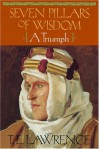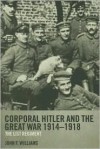Currently reading
Gabriela, Cravo e Canela
Progress:
157/358 pages
Seven Pillars of Wisdom: A Triumph (The Authorized Doubleday/Doran Edition)
Progress:
189/672 pages
The Creature from Jekyll Island: A Second Look at the Federal Reserve
Progress:
41/608 pages
Peter the Great
Progress:
472/934 pages
Under the Loving Care of the Fatherly Leader: North Korea and the Kim Dynasty
A Time for Trumpets: The Untold Story of the Battle of the Bulge
Progress:
191/712 pages
The German Army 1933-1945
Progress:
198/598 pages
Corporal Hitler and the Great War 1914-1918: The List Regiment
Progress:
22/238 pages
A PSYCHIATRIC APPRAISAL OF A DEFEATED, TOTALITARIAN STATE

The chief value in "The Nuremberg Interviews" comes from the views, perspectives, and at times, candid reflections offered by the 33 defendants and witnesses whom Dr. Goldensohn (then a U.S. Army psychiatrist) interviewed during 1946. In reading this book, I felt as if I were in company with Dr. Goldensohn and his interpreter as he carried our his enquiries of each person. Hermann Goering, nominally the Number 2 man in the Third Reich, didn't strike me as a person given to much introspection or regret. Rather, he came across as a man who enjoyed wielding power and showed no contrition about the Holocaust and several of the other crimes committed by Hitler, whom he regarded largely as a genius.
On the other hand, Rudolf Hoess, the commandant of Auschwitz, showed no evasiveness when speaking about his responsibility for the extermination of 5 million people. He fully accepted his guilt and the likelihood he would be hanged for his crimes (which took place in Poland in 1947).
For any reader interested in understanding the mindsets and philosophies of individuals who served a totalitarian state, I strongly recommend this book.
For any reader interested in understanding the mindsets and philosophies of individuals who served a totalitarian state, I strongly recommend this book.













